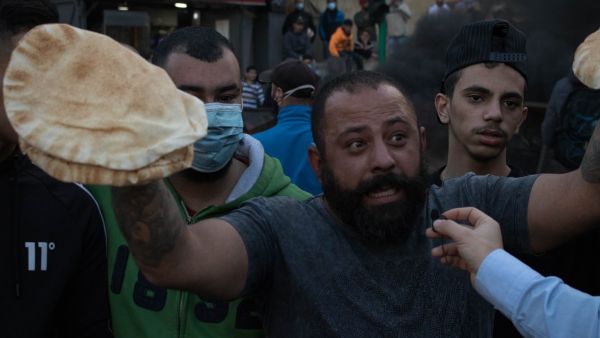For 17 months now, the Lebanese economy has been suffering an acute economic crisis, one that has led thousands of people to the streets several times so far, demanding "an end to the corruption promoted by the political elite" they blame the crisis on.
With the #Dollar selling for 10,000 lira to $1 and over half the day without electricity, people are taking to the streets to protest and express their rate at the situation. Many roads across #Lebanon are now being blocked. #لبنان #لبنان_ينتفض #لبنان_ليس_بخير #دولار pic.twitter.com/5g6AVb9jm7
— Nicholas Frakes | نيكولاس فرايكس (@nicfrakesjourno) March 2, 2021
In October 2019, crowds of Lebanese people took to the streets in hundreds of thousands demanding an end to the financial crisis that had not yet been deepened in the country.
The crisis started back then due to political unrest and government failures to fight decades-long standing corruption in policies that have arguably favored the ruling elite following the civil war (1975-1990).
And protests have started in earnest. #Tripoli roads blocked as well as the road to the airport in #Beirut ??(via WhatsApp) pic.twitter.com/VJjZtbZ3gk
— Maha Yahya (@mahamyahya) March 2, 2021
Due to what has been described as "the banking sector collapse," the Lebanese lira has plunged to an all-time low at 10,000 per dollar compared to 1500 that had been set by the central bank prior to September 2019.
This latest drop has prompted angry Lebanese to go back to the streets, blocking roads and demanding major political changes that ensure an end to their plight.
No electricity, no food, no clean water, no money, 1$=10,000 Lebanese pounds, people have no access to their bank accounts, no protection, no health, no insurance, no education, no universities, no schools, no fuel... I don’t, WE don’t feel safe anymore in Lebanon#لبنان_ليس_بخير
— Aly and not Ali :) (@wizardclubb) March 2, 2021
Small protest + burning tyres outside Al Amine mosque in downtown Beirut as the Lebanese pound hits a new low.
— Sunniva Rose (@Sunniva_Rose) March 2, 2021
Local media reports more protests across the country tonight. pic.twitter.com/qGYXYhqZkj
Lebanon is still suffering the consequences of the Beruit blast that severely damaged several neighborhoods in the capital city last August, amidst doubts that the government is going to carry out a thorough and transparent investigation, ones inspired by the belief that politicians involved in the catastrophic blast will not allow such an investigation to condemn them.
World Bank threatens to stop funding Lebanon's COVID-19 vaccines after reported violations https://t.co/TiMGyEmacj pic.twitter.com/vYvCf9u1ac
— Reuters World (@ReutersWorld) February 23, 2021
Similarly, a vaccine scandal has been uncovered two weeks ago when medical sources revealed that a number of politicians have been taking advantage of the vaccinations program funded by the World Bank, jumping queue receiving shots despite priority rules set previously, which may endanger efforts to secure the efficient number of jabs needed to reopen the country and get the Lebanese economy back on track.







